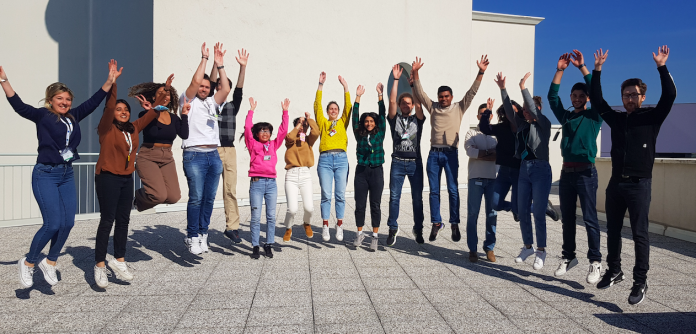Each year, young scientists from almost 70 Member States undertake research in the laboratories of the International Centre for Genetic Engineering and Biotechnology. Youth, essential to nurturing a brighter and more equitable future, constitutes the backbone of the ICGEB’s training programmes that have been operating for over three decades across the world.
To celebrate the month of the European Youth Goals, ICGEB hears from some of the Fellows from across Europe who are undertaking research in the laboratories in Trieste, Italy. Their diversity, wealth of experience, and passion for science are testimony to the importance of project funding. Among these are Fellows working in the Molecular Virology laboratory where the TBFVnet: surveillance and research on tick-borne aviviruses (TBFV) project of the Norway Grants Fund is carried out.
Denis Rajnović was born and spent part of his childhood in Sweden, after which his family returned to Rijeka (Fiume), Croatia. “I finished my Bachelor and Master’s degree in drug Research and Development at the University of Rijeka. During my Master’s, I performed internships in recombinant protein production, recombinant protein interaction analysis and yeast genetics, in Slovenia and Spain. While pursuing my PhD degree in Microbiology at the Autonomous University of Barcelona, I also studied influenza biosensors, as well as in single cell manipulations with FluidFM technology in Zurich, Switzerland.” Under an ICGEB-Elettra fellowship Denis pursues research in structural biology, biophysics, life sciences, and biotechnology to elucidate biological and behavioral characteristics of SARS-CoV-2 variants and to contribute to pandemic preparedness.
Chiara Kalebić, also from Croatia, completed her Master’s degree in Functional Genomics at the University of Trieste and in Molecular and Cellular Biology at the University of Rennes1, France. She was awarded a Fellowship in the Molecular Virology Group and subsequently obtained a PhD position in autumn.
Dr. Ljiljana Sjekloća, Postdoctoral fellow in the Molecular Pathology lab, hails from Montenegro. She left her home country at the age of eighteen, driven by the war of the 1990s in former Yugoslavia. “I came to Trieste because of its proximity to Montenegro and for the excellent organisation of scientific courses. I graduated in Molecular Biology and obtained a PhD in structural and functional genomics from the International School for Advanced Studies, SISSA, in Trieste, carrying out research on cytoskeletal proteins at the Elettra Synchrotron.” While a doctoral student at the University of Vienna, Ljiljana became passionate about RNA, an experience that led her to investigate the interactions between proteins and ribonucleic acids, and led to her working in numerous centres of excellence in the field, including the MRC in London, EMBL in Grenoble, the Karolinska Institute in Stockholm, Harvard Medical School, Boston, and NIH Bethesda, to become a specialist in protein and RNA modifications. She is carrying out a research project on amyotrophic lateral sclerosis (ALS), in the Molecular Pathology lab headed by Emanuele Buratti.
Emanuele Orsini, is one of the Italian fellows at ICGEB Trieste who joined the Molecular Virology group to study the interactions between SARS-CoV-2 and the host cell. “The family of Coronaviruses includes RNA viruses, causing respiratory diseases with highly epidemic potential. Indeed, the most recent epidemic outbreaks before COVID-19 were caused by coronaviruses (SARS-COV and MERS). Nonetheless, the risks posed by coronaviruses were underestimated by the research community that kept focusing on topics more relevant for the public health of western countries (such as cancer, cardiovascular or neurodegenerative diseases). The SARS-CoV-2 outbreak dramatically revealed our lack of knowledge. As an ICGEB fellow I am doing my best to give my contribution, however small, to a better understanding of coronavirus biology and to expand our toolbox against emerging diseases. At the same time, I hope the ICGEB will become a leading institution in the global community to establish research priorities.”
Urša Šušnjar Hribar, Junior Research Technician in the ICGEB Molecular Virology Lab, comes from Slovenia. Dr. Šušnjar also pursues projects in science communication and recently featured in the ICGEB documentary “The Goals of Science“, for the project on SARS-CoV-2 diagnostics. Slovenia is a partner of the TBFVnet project, as is ICGEB Member State Moldova – whose Fellow Assistant prof. Mariana Ulinici was recently interviewed for the women in science video series.
Antonio Mura, PhD student in the Molecular Medicine Laboratory at ICGEB is from Ittiri, a small town in Sardinia, where he graduated in Biotechnology. “I have lived in Trieste since 2017, when I started my Master’s degree in Neuroscience. I’m currently focusing on the characterisation of molecular pathways related to Fam3c, a protein that our laboratory discovered to protect the heart after myocardial infarction. Considering that cardiovascular diseases are the leading cause of death globally, we believe that understanding the key players involved in the beneficial effect exerted by Fam3c is of paramount importance.”
Dr. Naida Babić Jordamović is from Sarajevo, Bosnia and Herzegovina, where she worked as Research Associate at the Verlab Research Institute for Biomedical Engineering and Biotechnology. She is a postdoctoral fellow in the Computational Biology Group, where she is working under the supervision of Dr. Silvano Piazza on investigating biological pathways as biomarker signatures for precise cancer treatment underlaying the importance of personalised medicine.
ICGEB training programmes represent an exciting opportunity to interact with people all over the world in state-of-the-art scientific environments and in all the top scientific institutes. Several hundred new ICGEB fellows yearly constitute an ICGEB Alumni body of over 3500 individuals from more than 60 countries around the globe, with an estimated 750 PhD awardees among them.
As we celebrate European Youth Goals, the Arturo Falaschi Fellowship Programme continues to expand in line with the UN 2030 Agenda and the Sustainable Development Goal 4 for Quality Education.


